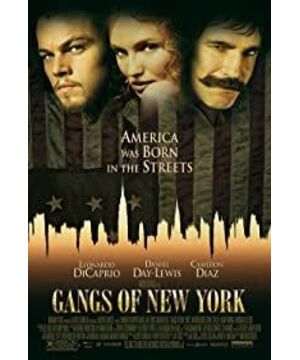To be honest, I don't know how much I should score for such a film with "historical commonality", and I will not comment on the scene, soundtrack, color, etc., so I just briefly talk about my understanding of the plot. I think this film mainly shows two conflicts, one is the conflict between the local culture and the foreign culture, and the other is the conflict between the bottom of society and the upper class. 1. The conflict between local culture and foreign culture The local gang and the dead rabbit gang represent different cultures. The local gang undoubtedly represents the local culture, and the dead rabbit gang represents the imported culture. For the invasion of imported culture, the local culture will certainly resist. The beginning of the film shows the victory of the local culture with the death of the priest. (PS: The knife at the beginning of the movie and the uncle who turned over the "money" are important turning points in the later plot) The pastor's son (little plum) was sent to the orphanage. 16 years later, when Xiao Lizi returned to his homeland, he saw the reality that some members of the Dead Rabbit Gang had become assistants to Bill (the head of the local gang), and some became policemen in official clothes (in fact, they were just Layers of human skin were placed on the outside of the wolf skin), and some were muddled and confused. In fact, this embodies the fusion of imported culture and local culture. Xiao Lizi also came to Bill to do things incognito, but secretly plotting revenge. Because of his outstanding ability, he got Bill's love and trust. Xiao Li seemed to appreciate Bill and gradually forgot about revenge. The matter of revenge was put back on the agenda after Bill was attacked while watching the drama (but I don't understand why this incident caused Xiao Li to change his attitude~). Later, Xiao Lizi’s sneak attack plan was leaked to Bill by his little friend who hated him because of love (the reason for hate because of love was simple: a woman! The little friend found that Xiao Li was sleeping with the goddess Jenny he had always been in love with). So at the celebration day dinner, Bill was prepared early, and later he was seriously injured and expelled from the local gang (I feel that at the celebration day dinner, Bill let Jenny come on stage to perform the throwing knife is a warning to Xiao Li, but Xiao Li did not aware). Then, under the care of Jenny, Xiao Lizi healed physically, but was lethargic. At this time, the uncle who turned over the "money" in the opening film returned the priest's relic knife to Xiao Lizi, and Xiao Lizi was invigorated to rebuild the dead rabbit gang and find a local help. I think the change in Xiao Lizi’s approach (from killing Bill to rebuilding the Dead Rabbit Gang) reflects the change in cultural retention: from strangling other cultures to protect oneself to the inheritance of his own culture, only inheritance can make cultural continuation survive (Bill did not Son is also such a metaphor, right?) Second, the conflict between the bottom of society and the upper class The gang is the power in the lower class, and the upper class is the power in the society. The upper class relied on the gang to complete the dark things that the "ming people" did not do, and the gang relied on the upper class to consolidate their power and status. When Xiao Lizi revived the Dead Rabbit Gang, the upper class abandoned Bill and sought cooperation with the Dead Rabbit Gang, which is more prestigious among immigrants, to gain votes from the immigrant population. The upper class used the port to lure foreigners who had just stepped into this land to die on the battlefield (during the Civil War) and forced conscription to the bottom of society. The rich could escape disaster by paying only $300. Finally, the bottom society rose up and retaliated (beating, miscellaneous, robbing, burning) against the upper class in the entire region. At the same time, blacks of the same class are not spared (maybe because during the Civil War, I am not very clear about this historical background, I only know that it is related to black slaves). In the end, the army suppressed the entire area with artillery fire. I don't know anything about the resistance, and the gangs who were busy arranging them were not spared from the gunfire. Xiao Lizi and Jenny, who were lucky enough to survive, claimed the corpse on the street, and had nothing to do with the gang. This is the obvious class contradiction, right? But can class contradictions be considered contradictions? Shouldn't contradictions be a battle between the same magnitudes? But the bottom class and the upper class are not in the same order of magnitude! Just like the upper grades bullying the lower grades, the lower grades resisted and punched the upper grades with two punches. The upper grades felt no pain or itching, and the upper grades hit back with a punch, and the lower grades went directly to the hospital. How many wars in history have gradually evolved from the above two conflicts, so this film has "historical commonality." In fact, these two kinds of conflicts are interests in the final analysis, right? But should culture involve interests? I have no idea. The above is my opinion on this video, welcome friends to exchange and share. Thanks~ How many wars in history have gradually evolved from the above two conflicts, so this film has "historical commonality." In fact, these two kinds of conflicts are interests in the final analysis, right? But should culture involve interests? I have no idea. The above is my opinion on this video, welcome friends to exchange and share. Thanks~ How many wars in history have gradually evolved from the above two conflicts, so this film has "historical commonality." In fact, these two kinds of conflicts are interests in the final analysis, right? But should culture involve interests? I have no idea. The above is my opinion on this video, welcome friends to exchange and share. Thanks~ How many wars in history have gradually evolved from the above two conflicts, so this film has "historical commonality." In fact, these two kinds of conflicts are interests in the final analysis, right? But should culture involve interests? I have no idea. The above is my opinion on this video, welcome friends to exchange and share. Thanks~ How many wars in history have gradually evolved from the above two conflicts, so this film has "historical commonality." In fact, these two kinds of conflicts are interests in the final analysis, right? But should culture involve interests? I have no idea. The above is my opinion on this video, welcome friends to exchange and share. Thanks~
View more about Gangs of New York reviews











